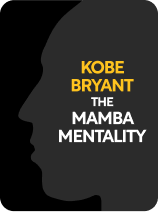

This article is an excerpt from the Shortform book guide to "The Mamba Mentality" by Kobe Bryant. Shortform has the world's best summaries and analyses of books you should be reading.
Like this article? Sign up for a free trial here .
What is the Mamba Mentality? What are the principles of the Mamba Mentality, and how does Kobe Bryant
The Mamba Mentality is both the title of Kobe Bryant’s book, and his philosophy in sports and in life. With the Mamba Mentality, you can approach life with focus and discipline.
Read more about the principles of the Mamba Mentality principles and the mentality’s meaning.
The Mamba Mentality: Meaning and More
What is the Mamba Mentality meaning? This book pairs brief reflections and commentaries written by Kobe Bryant alongside iconic photos from the Los Angeles Lakers’ official photographer Andrew D. Bernstein to offer a view inside the mind and career of one of the greatest basketball players in NBA history. He was drafted to the league from high school and spent his entire 20-year career with the Lakers. During that time, Kobe became a leader on his team and in the league, and he was admired for his unrelenting drive and commitment to becoming the best basketball player he could be. That, in essence, was the Mamba Mentality.
The Mamba Mentality came to transcend basketball—it applies to anyone who is striving to achieve greatness in her field. There is no single definition, but over time, it came to represent a mindset that encompasses hard work, obsessive preparedness, and dogged persistence on the journey to achieving a goal.
For the sake of clarity, we’ve grouped Kobe’s advice and reflections into the themes that represent the Mamba Mentality, including discipline, preparedness, and persistence.
Be Disciplined
What is the Mamba Mentality? There are several Mamba Mentality principles to keep in mind. From a young age, Kobe had an intrinsic motivation to do anything necessary to become a top-notch basketball player. Kobe wanted to be great, and he knew that, in order to achieve that, he had to work harder than everyone else and make sacrifices others were unwilling to make. Throughout his career, Kobe maintained a grueling schedule, which included both early mornings and late nights of practice, workouts, and film sessions. While other players eased up on their workouts during the season to avoid wearing themselves out, Kobe carried on. Although his schedule was tiring, it also helped him maintain endurance throughout the season and into the playoffs.
Be Prepared, Both Physically and Mentally
Kobe was strategic about practicing and improving his skills in every aspect of the game—and that started with fundamentals. Many other players neglected the fundamentals, to the extent that Kobe’s focus on the basics actually gave him an edge over his competitors. For example, while other players practiced dribbling crossovers, Kobe worked on making his footwork efficient, so that he could get where he needed to go on the court quickly while conserving energy. Kobe also made a point of having a versatile set of skills. His versatility had two primary benefits:
- When Kobe faced opponents who had researched his strengths and tendencies, he was able to catch them off-guard by switching up his direction and his pace.
- When Kobe had to play through injuries, he could adjust his playing style (for example, by playing with his left hand) and still have a strong game.
Above all, Kobe trained with a focus on staying in control. In other words, he worked to avoid letting his opponent limit or otherwise dictate how he could play. Kobe studied players across the league to learn their strengths and weaknesses, so that he knew exactly how to play against them. He was never intimidated by facing talented opponents—he merely adjusted his game accordingly.
Besides physical preparation, Kobe also trained mentally and emotionally. He worked on improving his focus—through reading, studying the game, and paying close attention to the coach during practice—so that he could be present and aware at all times. Kobe also knew that emotional highs and lows could derail a player’s game, so he made a point of staying calm and focused.
Never Stop Improving
Another of the Mamba Mentality principles is about the effort to reach success, not the moment you reach the finish line. No matter how many championship rings Kobe won (he won five), he always wanted more. Kobe had worked tirelessly as a player and team leader, and, although he demanded a lot from his teammates, he also did everything he could to bring them to victory. When Kobe did inevitably face losses, he carried on just as he would have after a win: He continued his workout, practice, and film-study regimen.
Kobe’s tried-and-true routine carried him through his entire career, down to the final game. The day of his last game felt like any other—until he walked into the arena, where the mood was somber. However, once the game started, Kobe played with the same passion, strategy, and intensity that had defined his 20-year career. By the time he retired, Kobe credited basketball with teaching him about leadership, human nature, and his own creativity. The Mamba Mentality had helped him achieve greatness in his basketball career, and it would continue to help him excel in his post-NBA endeavors.

———End of Preview———
Like what you just read? Read the rest of the world's best book summary and analysis of Kobe Bryant's "The Mamba Mentality" at Shortform .
Here's what you'll find in our full The Mamba Mentality summary :
- How Kobe Bryant was able to play and dominate the best players
- Why Kobe took up tap dancing for a summer
- How reading the referee's handbook helped Kobe improve his game






